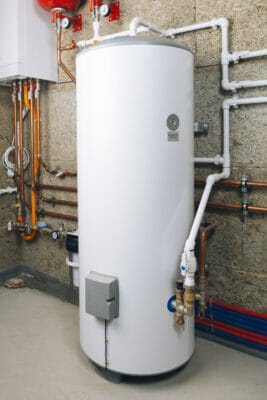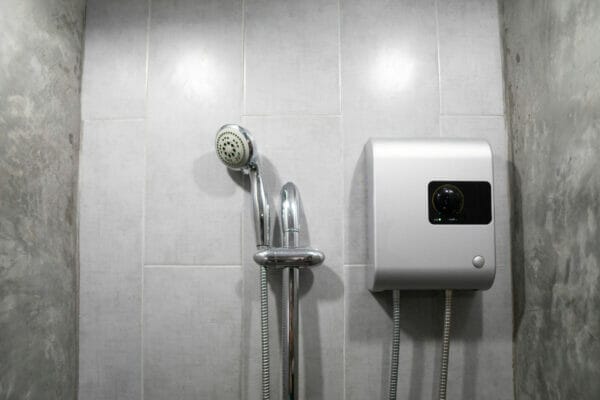Disclaimer: This post may contain affiliate links, meaning we get a small commission if you make a purchase through our links, at no cost to you. For more information, please visit our Disclaimer Page.
A water heater is considered an appliance in some circumstances. This definition depends largely on your wording when describing your water heater in your lease agreement and insurance policy.

Table of Contents
What Makes My Water Heater An Appliance?
A few factors influence the probability of your water heater being regarded as an appliance. These include a mutual agreement between you and a third party when;
- Entering your rental property’s value on tax documents
- Entering rental property’s expenses on tax documents
- Signing or creating a rental lease
- Managing the water heater’s inventory on a rental property
- Purchasing homeowners insurance
Is A Water Heater A Plumbing Fixture?
A water heater is considered a plumbing fixture if a plumber installed it in your home. If your water heater is attached to a system of pipes that carry water throughout your building, it is a fixture.
The water heater fixture could be permanent or temporary and must have been screwed, bolted, nailed, or cemented to the wall, floor, or ceiling of your building.
Is A Water Heater Electrical Equipment?
Not all water heaters are electrical equipment. They are many categories of water heaters, and electrical ones are one of the categories. If your water heater depends on an electricity connection to fully function, then it is considered a piece of electrical equipment.
What Are The Types Of Water Heaters?
As mentioned, there are different categories of water heaters. The different types of water heaters use various channels of energy to operate.
There are five main types of water heaters that you should know about to understand their uses, benefits, and downfalls.
Conventional Tank Water Heater
The conventional tank water heater is the most common. It has a tank that holds gallons of water to be heated and reserved. The capacity of the water within the tank determines how hot the water gets, how fast it heats and how long it will last.
The water heater tank is insulated to keep the reserve water hot or warm until usage. It has two valves; one for temperature control to moderate heat and the other to control pressure.
It is a common household heater, but it limits the amount of hot water you use. The smaller the tank, the more restricted you are.
Maintenance
Maintenance is key for a conventional tank water heater. Since it constantly stores and heats water, it is prone to have sediment and mineral scale. You need to clean it out regularly by flushing it out to increase your water tank’s longevity.
It is advisable to clean out your water tank twice a year to minimize corrosion. Also, check on the pressure relief valves annually to ensure they are not leaking. A conventional water heater’s lifespan is about 12 years.
Benefits
The conventional water heater is affordable and easy to install. It is also convenient for those who want want to keep hot water reserves for multiple usages.
Disadvantages
The conventional water heater holds specific amounts of water at a time. The amount of water depends on the tank’s capacity. A 60-gallon tank will hold 60 gallons of water, and that is the flow of hot water you will get.
Once the 60 gallons run out, you will have to wait for the tank to refill and reheat the water.
They are also prone to corrosion which eventually leads to water heater leaks.

Tankless Water Heater
This water heater has no reserve water tank but offers an endless supply of water on demand. It has heating elements that instantly heat water as it flows through the pipes.
It is ideal for multiple users because you will not run out of water capacity. Tankless water heaters come in different sizes, so the larger your household, the bigger it should be. Small water heaters might not withstand high usage and will result in cold or warm water instead of hot.
Tankless water heaters can either run on gas or electric power. The gas tankless water heater will be best if you have a large household to on electricity.
Maintenance
Though tankless, your water heater still needs to be flushed out to remove sediment and mineral scale. Since the cleaning space is much smaller, you can do so by connecting a hose to your pump and flushing out the water until you are sure it is clean.
You should also clean the tank’s exterior. Dust and debris can gather and get into your tank and possibly make the interior dirty.
A tankless water heater’s lifespan is up to 20 years.
Advantages
Tankless water heaters are energy efficient. They heat water on demand, so you save energy until it is required. It also offers households an endless supply of water.
Tankless water heaters are significantly smaller, so they consume less space. Since they are not prone to excessive corrosion, there is a lower risk of water heater leaks.
Disadvantages
Tankless water heaters are expensive. Buying and installing the unit is a costly investment. F your water heater runs on electricity, you will not have a hot water supply since there is no tank to reserve hot water.
Condensing Water Heater
This water heater operates primarily on natural gas and saves on energy consumption. They can be both tank and tankless.
Condensing water heater systems have a second heat exchanger compared to traditional water heaters. They loop the exhaust back to the heating system before it is released. The gases pass through the secondary heat exchanger, and the heat is transferred to the cold water.
The water passes through the primary heat exchanger, where it gets its preferred temperature. Recycling this exhaust causes vapor formation, which cools and condenses. It then flows back to your water supply.
Maintenance
The primary maintenance that this water heater need is cleaning the tanks or flushing out water to prevent sediment and mineral settlement that leads to corrosion.
The gas import valves also need to be cleaned to prevent the formation of rust. Condensing water heaters last up to 20 years.
Advantages
It is the most energy-efficient water heater as it relies on natural gas to function. The water heater’s tank is also large, so there is plenty of water available for use.
Disadvantages
This water heater only works for homes with natural gas. It also comes in big-sized tanks that hold no less than 55 gallons of water, so it may not be ideal for all households.
Heat Pump Water Heater
This water heater uses heat from the ground and air to heat the water. It uses electricity to move heat from the ground and air as opposed to generating the heat itself. It uses less electricity compared to traditional water heaters.
The pump needs quite some vertical room on your roof as the pump is located on top.
Maintenance
Like all water heater tanks, the heat pump water heater needs regular cleaning to avoid corrosion and increase its lifespan of about 15 years.
Advantages
Heat pump water heaters save up a lot of energy, so you will cut on electricity costs.
Disadvantages
This water heater relies on heat from the air below, above, and around it. If you experience cold weather, your heater might not work to its full capacity.
